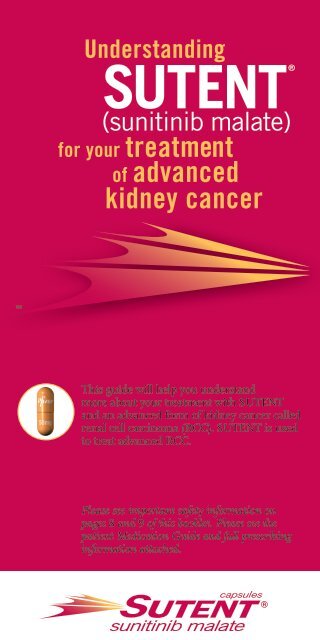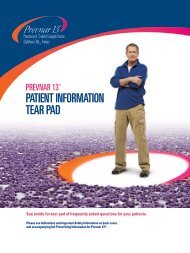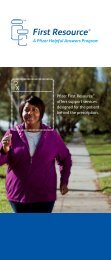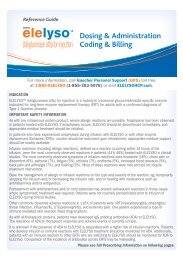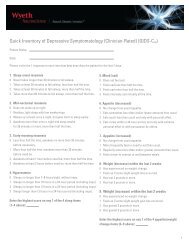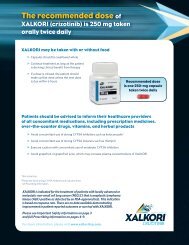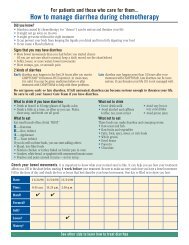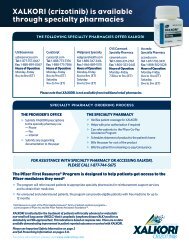SUTENT - PfizerPro
SUTENT - PfizerPro
SUTENT - PfizerPro
You also want an ePaper? Increase the reach of your titles
YUMPU automatically turns print PDFs into web optimized ePapers that Google loves.
Understanding<br />
®<br />
(sunitinib malate)<br />
for your treatment<br />
of advanced<br />
kidney cancer<br />
<br />
This guide will help you understand<br />
more about your treatment with <strong>SUTENT</strong><br />
and an advanced form of kidney cancer called<br />
renal cell carcinoma (RCC). <strong>SUTENT</strong> is used<br />
to treat advanced RCC.<br />
Please see important safety information on<br />
pages 8 and 9 of this booklet. Please see the<br />
patient Medication Guide and full prescribing<br />
information attached.
Inside<br />
You will find helpful information on many<br />
important topics:<br />
What is <strong>SUTENT</strong>? 3<br />
What is cancer? 4<br />
What is RCC? 5<br />
How does <strong>SUTENT</strong> work? 6<br />
Important safety information 8<br />
What should I tell my healthcare provider<br />
before taking <strong>SUTENT</strong>? 10<br />
What are the possible side effects? 11<br />
How to manage side effects 15<br />
How to take <strong>SUTENT</strong> 20<br />
Resources for you 22<br />
First Resource ® : Making access easier for you 26<br />
Answers to your questions 30<br />
Terms to know 34<br />
What is<br />
<strong>SUTENT</strong> ® ?<br />
(sunitinib malate)<br />
<strong>SUTENT</strong> is a medicine that treats cancer.<br />
It comes in 12.5-mg, 25-mg, and 50-mg<br />
capsules. You take <strong>SUTENT</strong> once per day<br />
by mouth. Do not open the capsules.<br />
<strong>SUTENT</strong> is used to treat an<br />
advanced form of kidney<br />
cancer, known as renal cell<br />
carcinoma (RCC). <strong>SUTENT</strong><br />
may slow or stop the growth<br />
of cancer. It may also help<br />
shrink tumors.<br />
<strong>SUTENT</strong> is available by prescription only.<br />
Your healthcare provider has prescribed<br />
<strong>SUTENT</strong> because he or she believes it is<br />
the most appropriate treatment for you.<br />
<strong>SUTENT</strong> may not be appropriate for<br />
all patients with RCC and has not been<br />
studied in children. <strong>SUTENT</strong> may not<br />
work the same in every person.<br />
Note: Words in bold type are defined on<br />
pages 34 and 35.<br />
3<br />
Please see important safety information on pages 8 and 9<br />
of this booklet. Please see the patient Medication Guide<br />
and full prescribing information attached.
What is<br />
cancer?<br />
What is<br />
RCC?<br />
The human body is made up of countless<br />
cells. Organs, such as the liver, kidneys,<br />
skin, or lungs, are made up of special<br />
types of cells that help these organs do<br />
their jobs. Most organs stay healthy by<br />
getting rid of old cells that can no longer<br />
work as they should. These old cells are<br />
then replaced by new cells. This process<br />
of new cells replacing old cells is well<br />
controlled. It takes place in the body all<br />
the time.<br />
Cancer occurs when this controlled process<br />
goes out of control. This is caused by a<br />
breakdown in a cell’s genetic program.<br />
This breakdown makes the cell grow and<br />
divide when it is not supposed to. When<br />
this happens, it becomes a cancer cell.<br />
Soon a large mass of cancer cells forms.<br />
The mass is called a tumor. Some tumors<br />
can spread and threaten your health.<br />
RCC is cancer that starts in the kidneys.<br />
Often, a person who has RCC has had<br />
a change in one of his or her genes.<br />
That gene is called VHL, or the von<br />
Hippel-Lindau gene.<br />
Some of the cancer cells may enter the<br />
bloodstream and spread to other parts of<br />
the body. New tumors may then develop<br />
in other organs. This is called metastasis.<br />
RCC may spread to your lungs, for<br />
example. If this happens, it is still called<br />
RCC (metastatic RCC), not lung cancer.<br />
RCC often grows as a single tumor within<br />
one kidney. Sometimes, more than one<br />
tumor grows in one kidney. Less often,<br />
tumors grow in both kidneys at the<br />
same time.<br />
5<br />
Please see important safety information on pages 8 and 9<br />
of this booklet. Please see the patient Medication Guide<br />
and full prescribing information attached.
How does<br />
<strong>SUTENT</strong> may slow or stop some cancers<br />
by blocking 2 basic processes that cause<br />
tumors to grow and spread. These<br />
processes are called proliferation<br />
and angiogenesis.<br />
Proliferation<br />
<strong>SUTENT</strong> ®<br />
(sunitinib malate)<br />
This is when a cell divides, creating<br />
2 cells where<br />
Angiogenisis<br />
there used to be only 1.<br />
Like the other cells in your body, cancer<br />
Tumor<br />
cells divide. The difference is that cancer<br />
cells divide more times than they should,<br />
forming a tumor. <strong>SUTENT</strong> may help<br />
slow down this New process. blood vessel<br />
Stages of proliferation<br />
work?<br />
Angiogenesis<br />
This is when new blood vessels form.<br />
These new blood vessels give tumors the<br />
nutrients and oxygen they need to grow.<br />
<strong>SUTENT</strong> may help stop this process.<br />
Angiogenesis<br />
Tumor<br />
New blood vessel<br />
7<br />
<strong>SUTENT</strong> may help stop proliferation<br />
and angiogenesis by blocking the<br />
signals that cause them. Without these<br />
2 processes, tumors cannot grow.<br />
Please see important safety information on pages 8 and 9<br />
of this booklet. Please see the patient Medication Guide<br />
and full prescribing information attached.
Important safety<br />
information<br />
<strong>SUTENT</strong> can cause serious liver problems,<br />
including death.<br />
Tell your healthcare provider right away<br />
if you develop any of the following during<br />
treatment with <strong>SUTENT</strong>: itching; yellow<br />
eyes or skin; dark urine; or pain or<br />
discomfort in the right upper stomach area.<br />
Your healthcare provider should do<br />
blood tests to check your liver function<br />
before you start taking <strong>SUTENT</strong> and<br />
during treatment.<br />
<strong>SUTENT</strong> may cause heart problems. Heart<br />
problems may include heart failure, heart<br />
muscle problems (cardiomyopathy), or<br />
abnormal heart rhythm changes. Tell your<br />
healthcare provider if you feel dizzy, faint,<br />
very tired, have abnormal heartbeats, are<br />
short of breath, or have swollen feet and<br />
ankles while taking <strong>SUTENT</strong>.<br />
<strong>SUTENT</strong> may cause high blood pressure.<br />
Your healthcare provider may check your<br />
blood pressure, and may treat you for high<br />
blood pressure.<br />
<strong>SUTENT</strong> may cause bleeding sometimes<br />
leading to death. Tell your healthcare<br />
provider right away if you have any of the<br />
following during treatment with <strong>SUTENT</strong>:<br />
serious bleeding; painful swollen stomach<br />
(abdomen); vomiting blood; black, sticky<br />
stools; bloody urine; headache or change<br />
in your mental status.<br />
Important safety<br />
information<br />
(continued)<br />
<strong>SUTENT</strong> may cause hormone problems,<br />
including thyroid and adrenal gland<br />
problems. Your healthcare provider may<br />
do tests to check your thyroid and adrenal<br />
gland function during <strong>SUTENT</strong> treatment.<br />
<strong>SUTENT</strong> may harm an unborn baby<br />
(cause birth defects). Do not become<br />
pregnant while taking <strong>SUTENT</strong>. If you do,<br />
tell your healthcare provider right away.<br />
Stop taking <strong>SUTENT</strong>. Do not breastfeed<br />
while taking <strong>SUTENT</strong>.<br />
Using <strong>SUTENT</strong> with other medicines<br />
can cause serious side effects. Tell your<br />
healthcare provider about all the medicines,<br />
vitamins, or herbal products you use.<br />
You may have side effects or reactions to<br />
<strong>SUTENT</strong>. For most patients, these are<br />
moderate and may be managed, though<br />
some can be serious. Your healthcare<br />
provider may change your dose or stop your<br />
treatment. Some of the most common side<br />
effects include tiredness, weakness, fever,<br />
diarrhea, nausea, vomiting, mouth sores,<br />
upset stomach, abdominal pain, constipation,<br />
skin or hair changes, taste changes, swelling,<br />
loss of appetite, and bleeding, such as from<br />
the nose or cuts. Tell your healthcare provider<br />
if you have any swelling or bleeding. Be sure<br />
to tell your healthcare provider about any new<br />
side effects you have, as well as any change or<br />
increase in any side effect.<br />
9<br />
Please see the patient Medication Guide and<br />
full prescribing information attached.
What should I tell my<br />
healthcare provider<br />
before taking <strong>SUTENT</strong>?<br />
Before taking <strong>SUTENT</strong>, tell your<br />
healthcare provider if you:<br />
have any heart problems<br />
have high blood pressure<br />
have thyroid problems<br />
have kidney function problems<br />
(other than cancer)<br />
have liver problems<br />
have any bleeding problem<br />
have seizures<br />
have any other medical conditions<br />
are pregnant, could be pregnant, or<br />
plan to become pregnant. <strong>SUTENT</strong><br />
may harm an unborn baby. You should<br />
not become pregnant while taking<br />
<strong>SUTENT</strong>. Tell your healthcare provider<br />
right away if you become pregnant while<br />
taking <strong>SUTENT</strong><br />
are breastfeeding or plan to breastfeed.<br />
You and your healthcare provider should<br />
decide if you will take <strong>SUTENT</strong> or<br />
breastfeed. You should not do both<br />
Using <strong>SUTENT</strong> with certain medicines<br />
can cause serious side effects. Tell your<br />
healthcare provider about all medicines<br />
you take. These include prescription<br />
medicines and nonprescription medicines,<br />
vitamins, and herbal supplements.<br />
Know the medicines you take. Keep a list of<br />
them to show your healthcare provider and<br />
pharmacist when you get a new medicine.<br />
Talk with your healthcare provider before<br />
starting any new medicines.<br />
Please see important safety information on pages 8 and 9<br />
of this booklet. Please see the patient Medication Guide<br />
and full prescribing information attached.<br />
What are the possible<br />
side effects?<br />
You may have side effects or reactions to<br />
<strong>SUTENT</strong>. Most patients have moderate<br />
side effects that can be managed, though<br />
some can be serious. In some cases, your<br />
healthcare provider may change your dose<br />
of <strong>SUTENT</strong> or stop treatment.<br />
Be sure to talk to your healthcare provider<br />
about any side effects or concerns that<br />
you have.<br />
Possible serious side effects<br />
Some side effects are more serious than<br />
others. It is important that you know the<br />
signs of these side effects so you can tell<br />
your healthcare provider if any of these<br />
problems occur:<br />
Serious liver problems. <strong>SUTENT</strong> can<br />
cause serious liver problems, including<br />
death. Tell your healthcare provider<br />
right away if you develop any of the<br />
following symptoms of liver problems<br />
during treatment with <strong>SUTENT</strong>:<br />
itching; yellow eyes or skin; dark urine;<br />
or pain or discomfort in the right upper<br />
stomach area<br />
Heart problems. Heart problems may<br />
include heart failure and heart muscle<br />
problems (cardiomyopathy). Tell your<br />
healthcare provider if you feel very tired,<br />
are short of breath, or have swollen feet<br />
and ankles<br />
Side effects continued on following page.<br />
11
What are the possible<br />
side effects? (continued)<br />
Abnormal heart rhythm changes.<br />
Your healthcare provider may do<br />
electrocardiograms and blood tests to<br />
watch for these problems during your<br />
treatment with <strong>SUTENT</strong>. Tell your<br />
healthcare provider if you feel dizzy,<br />
faint, or have abnormal heartbeats while<br />
taking <strong>SUTENT</strong><br />
High blood pressure. Your healthcare<br />
provider may check your blood pressure<br />
during treatment with <strong>SUTENT</strong>. Your<br />
healthcare provider may prescribe<br />
medicine for you to treat high blood<br />
pressure, if needed<br />
Bleeding, sometimes leading to death.<br />
Tell your healthcare provider right away<br />
if you have any of these symptoms or<br />
a serious bleeding problem during<br />
treatment with <strong>SUTENT</strong>:<br />
— painful, swollen stomach (abdomen)<br />
— vomiting blood<br />
— black, sticky stools<br />
— bloody urine<br />
— headache or change in your<br />
mental status<br />
Your healthcare provider can tell you other<br />
symptoms to watch for.<br />
Please see important safety information on pages 8 and 9<br />
of this booklet. Please see the patient Medication Guide<br />
and full prescribing information attached.<br />
Hormone problems, including thyroid<br />
and adrenal gland problems. Your<br />
healthcare provider may do tests to<br />
check your thyroid and adrenal gland<br />
function during <strong>SUTENT</strong> treatment.<br />
Tell your healthcare provider if you<br />
have any of the following signs<br />
and symptoms during treatment<br />
with <strong>SUTENT</strong>:<br />
— tiredness that worsens or does not<br />
go away<br />
— loss of appetite<br />
— intolerance to heat<br />
— feeling nervous or agitated, tremors<br />
— sweating<br />
— nausea or vomiting<br />
— diarrhea<br />
— fast heart rate<br />
— weight gain or weight loss<br />
— feeling depressed<br />
— irregular menstrual periods or no<br />
menstrual periods<br />
— headache<br />
— hair loss<br />
Common side effects<br />
Patients who take <strong>SUTENT</strong> have these side<br />
effects more often than other side effects:<br />
tiredness<br />
weakness<br />
fever<br />
Side effects continued<br />
on following page.<br />
13
What are the possible<br />
side effects? (continued)<br />
gastrointestinal symptoms, including<br />
diarrhea, nausea, vomiting, mouth<br />
sores, upset stomach, abdominal pain,<br />
and constipation<br />
changes in color of hair or skin. The<br />
medicine in <strong>SUTENT</strong> is yellow, and it<br />
may make your skin look yellow. Your<br />
skin and hair may get lighter in color<br />
yellow eyes or skin. Yellow eyes or skin<br />
may also be a sign of serious liver<br />
problems. Call your healthcare<br />
provider right away if you develop<br />
these symptoms<br />
rash or other skin changes, including<br />
drier, thicker, or cracking skin<br />
blisters or a rash on the palms of your<br />
hands and soles of your feet<br />
taste changes<br />
loss of appetite<br />
pain or swelling in your arms or legs<br />
cough<br />
shortness of breath<br />
bleeding, such as nosebleeds or<br />
bleeding from cuts<br />
Be sure to tell your healthcare provider<br />
if there is any change or increase in<br />
your side effects. Do not wait until your<br />
symptoms become worse.<br />
There are also steps you can take on your<br />
own to ease some of these problems. See<br />
pages 15-18 of this booklet for some tips.<br />
Please see important safety information on pages 8 and 9<br />
of this booklet. Please see the patient Medication Guide<br />
and full prescribing information attached.<br />
How to<br />
manage<br />
side effects<br />
You may have had some of<br />
these common side effects<br />
before starting treatment<br />
with <strong>SUTENT</strong>, and you<br />
may take steps on your<br />
own to ease some of<br />
these problems. Always<br />
talk to your healthcare<br />
provider about any side effects<br />
you have as soon as you notice them. Do<br />
not wait until they become more serious to<br />
tell your healthcare provider.<br />
Feeling tired/Fatigue. While<br />
you are taking <strong>SUTENT</strong>, you may feel less<br />
desire to do normal activities or you may<br />
feel tired, weary, or exhausted.<br />
If you feel tired or fatigued, these tips<br />
may help:<br />
Stay as active as possible, setting<br />
short-term goals<br />
Try to maintain normal work and<br />
social schedules<br />
Take naps or rest when you can<br />
Inform your doctor or nurse when your<br />
fatigue begins to keep you from doing<br />
your normal activities<br />
Diarrhea. You may have changes in<br />
bowel habits and stool consistency while<br />
you are taking <strong>SUTENT</strong>.<br />
How to manage side effects continued on following page.<br />
15
How to manage<br />
side effects (continued)<br />
These tips may help relieve your diarrhea:<br />
Take antidiarrheal medicine as<br />
recommended<br />
Drink fluids often, in small sips<br />
Add bananas and rice to your diet<br />
Choose high-protein foods, skim or low-fat<br />
milk, and desserts low in fat and lactose<br />
Nausea or vomiting. While<br />
taking <strong>SUTENT</strong>, you may throw up or feel<br />
as if you are about to throw up.<br />
If you experience nausea or vomiting,<br />
these tips may help:<br />
Be sure you are drinking enough fluids<br />
Find out from your healthcare provider<br />
if there are any other medicines you<br />
may be taking that might be adding to<br />
your nausea<br />
Eat and drink slowly and have small<br />
meals throughout the day<br />
Avoid sweet, fried, or fatty foods, as well<br />
as foods with strong odors<br />
TASTE CHANGES. You may notice<br />
that foods you usually enjoy taste bland,<br />
different, or bad while you are taking<br />
<strong>SUTENT</strong>. This is common in people who<br />
are being treated for cancer.<br />
If you have taste changes, these tips<br />
may help:<br />
Cold foods may taste better than hot foods<br />
Flavor your food with herbs, seasonings,<br />
sugar, lemon, or sauces<br />
Please see important safety information on pages 8 and 9<br />
of this booklet. Please see the patient Medication Guide<br />
and full prescribing information attached.<br />
Mouth sores/stomatitis.<br />
You may have sores or redness in your<br />
mouth while taking <strong>SUTENT</strong>. You may<br />
also have mouth pain, bleeding gums,<br />
trouble swallowing, or cracks on the<br />
corner of the mouth.<br />
If you have mouth sores or stomatitis,<br />
these tips may help:<br />
Avoid hot, spicy, or acidic foods<br />
Eat foods that are soft<br />
Use a straw to drink liquids<br />
Use an alcohol-free mouthwash<br />
Use mild toothpaste<br />
Keep a clean and healthy mouth by<br />
brushing and flossing often<br />
Upset stomach. While taking<br />
<strong>SUTENT</strong>, you may have an upset<br />
stomach or indigestion.<br />
If you have an upset stomach, these tips<br />
may help:<br />
Avoid heavy meals, coffee, and alcohol<br />
Reduce your stress<br />
Sleep in a more upright position,<br />
propped up on a pillow<br />
Take antacids as recommended<br />
How to manage side effects continued on following page.<br />
17
How to manage<br />
side effects (continued)<br />
Skin or hair changes. While<br />
taking <strong>SUTENT</strong>, you may have changes<br />
in your skin or hair color. Yellow eyes or<br />
skin may also be a sign of serious liver<br />
problems. Call your healthcare provider<br />
right away if you develop these symptoms.<br />
You may also experience dryness,<br />
thickening, or cracking of the palms of your<br />
hands and/or soles of your feet or other body<br />
parts. Some patients may have blisters or a<br />
rash. This is called hand-foot syndrome.<br />
Tell your healthcare provider if you develop<br />
these problems. He or she may give you<br />
specific treatments.<br />
Cracking of skin<br />
on sole of foot<br />
Your<br />
healthcare<br />
provider can talk<br />
with you about any side<br />
effects or concerns you have.<br />
You may use the space below<br />
to note which side effects you<br />
have and when you have them.<br />
Bring this list with you to<br />
your next visit with your<br />
healthcare provider.<br />
19<br />
Photo courtesy of Cleveland Clinic Taussig Institute.<br />
If you have skin or hair changes, these tips<br />
may help:<br />
Use a sunscreen daily<br />
Wear rubber or cotton-lined gloves to do<br />
household chores<br />
Moisturize frequently<br />
Take short, lukewarm showers using<br />
a moisturizing soap<br />
Use an over-the-counter cream<br />
or ointment<br />
Please see important safety information on pages 8 and 9<br />
of this booklet. Please see the patient Medication Guide<br />
and full prescribing information attached.
How to take<br />
<strong>SUTENT</strong> ®<br />
(sunitinib malate)<br />
<strong>SUTENT</strong> is taken by mouth<br />
— Your healthcare provider will choose<br />
the dose that is most appropriate<br />
for you<br />
— He or she may change or hold your<br />
dose from time to time<br />
— Depending on the dose, you may<br />
need to take 1 or more capsules<br />
— You may take <strong>SUTENT</strong> with or<br />
without food<br />
<strong>SUTENT</strong> is taken in 6-week cycles<br />
— Take <strong>SUTENT</strong> every day for the first<br />
4 weeks (days 1 to 28) of this cycle<br />
— Stop taking <strong>SUTENT</strong> for the next<br />
2 weeks (days 29 to 42) to complete<br />
the cycle<br />
— Then begin the next 6-week cycle<br />
Continue taking <strong>SUTENT</strong> as directed<br />
by your healthcare provider—do not<br />
open the capsules<br />
If you miss a dose, take it as soon as you<br />
remember. Do not take it if it is close to<br />
your next dose. Just take the next dose at<br />
your regular time. Do not take more than<br />
1 dose of <strong>SUTENT</strong> at a time. Tell your<br />
healthcare provider about the missed dose<br />
Start<br />
WEEK 1<br />
TAKE <strong>SUTENT</strong><br />
Take<br />
EVERY DAY<br />
WEEK 2<br />
<strong>SUTENT</strong><br />
FOR 4 WEEKS<br />
(28 every DAYS).<br />
day<br />
WEEK 3<br />
for 4 weeks<br />
(28 days).<br />
Call your healthcare provider right away<br />
if you take too much <strong>SUTENT</strong><br />
Do not drink grapefruit juice or eat<br />
grapefruit while taking <strong>SUTENT</strong><br />
Make sure to tell your doctor or<br />
nurse if you are taking any other<br />
medicines, vitamins, or herbal products<br />
— This includes any supplements or<br />
over-the-counter products<br />
WEEK 4<br />
WEEK 5<br />
WEEK 6<br />
1 2 3 4 5 6 7<br />
8 9 10 11 12 13 14<br />
15 16 17 18 19 20 21<br />
22 23 24 25 26 27 28<br />
<br />
<br />
29 30 31 32 33 34 35<br />
36 37 38 39 40 41 42<br />
<br />
<br />
<br />
STOP<br />
<strong>SUTENT</strong> 50 mg <strong>SUTENT</strong> 25 mg <strong>SUTENT</strong> 12.5 mg<br />
Capsules shown are not actual size.<br />
21<br />
DO Do not NOT take<br />
TAKE<br />
<strong>SUTENT</strong> FOR<br />
<strong>SUTENT</strong> for<br />
2 WEEKS<br />
(14 weeks DAYS).<br />
(14<br />
THEN Tdays). H E N Then START S start R T<br />
THE Tthe H cycle E CYCLE C again. Y C L E<br />
AGAIN. A G A II Please see important safety information on pages 8 and 9<br />
of this booklet. Please see the patient Medication Guide<br />
and full prescribing information attached.
Resources<br />
for you<br />
For more information about <strong>SUTENT</strong>,<br />
talk with your healthcare providers.<br />
The resources listed below can offer you<br />
support and information about cancer.<br />
You may find that learning more about<br />
your disease and treatment or talking with<br />
other patients is helpful. These resources<br />
may also help your family and caregivers.<br />
<strong>SUTENT</strong>.com<br />
This single Web destination for everything<br />
<strong>SUTENT</strong> provides you with:<br />
Information about RCC<br />
Facts about <strong>SUTENT</strong> treatment<br />
Resources for you and your caregivers<br />
Assistance obtaining <strong>SUTENT</strong><br />
If you want to receive updates about RCC<br />
or <strong>SUTENT</strong>, sign up by clicking on “Get<br />
e-mail updates.”<br />
The Kidney Cancer Association (KCA)<br />
800-850-9132, www.curekidneycancer.org<br />
The KCA is a group of patients, families,<br />
doctors, and healthcare providers who are<br />
all involved with kidney cancer. On the<br />
KCA Web site, you can learn about:<br />
Kidney cancer and treatments<br />
Simple ways to make living with kidney<br />
cancer easier<br />
Finding and meeting other kidney<br />
cancer patients and survivors<br />
The American Cancer Society (ACS)<br />
800-227-2345, www.cancer.org<br />
The ACS is a resource for patients<br />
and healthcare providers alike. The ACS<br />
Web site has news, facts, and useful tips<br />
for you and your family, including:<br />
News about cancer studies<br />
Facts about treatments<br />
Stories about cancer survivors<br />
Helpful advice about RCC<br />
Links to support groups<br />
23<br />
Resources continued on following page.<br />
Please see important safety information on pages 8 and 9<br />
of this booklet. Please see the patient Medication Guide<br />
and full prescribing information attached.
for you<br />
Resources<br />
(continued)<br />
You<br />
can find more<br />
information on<br />
cancer and support<br />
groups on<br />
the Internet at<br />
sutent.com<br />
Cancercare<br />
800-813-4673, www.cancercare.org<br />
The Cancercare Web site provides support<br />
services to people affected by cancer with:<br />
Helpful cancer advice and counseling<br />
Facts about cancer<br />
Free financial services<br />
The National Cancer Institute (NCI)<br />
800-422-6237, www.cancer.gov<br />
The NCI Web site has many facts about<br />
cancer, treatments, and clinical trials. You<br />
can also find other useful topics, such as:<br />
How to pay for cancer treatment<br />
Choosing hospice and home care<br />
Finding support groups<br />
The National Comprehensive Cancer<br />
Network (NCCN)<br />
215-690-0300, www.nccn.com<br />
The NCCN Web site has information for<br />
patients and their caregivers and families about<br />
cancer. On the NCCN Web site, you can find:<br />
Treatment summaries and guidance<br />
Advice on obtaining financial assistance<br />
Tips for living with cancer<br />
<strong>SUTENT</strong> Patient Call Center<br />
877-578-8368<br />
The call center is a free service open Monday to<br />
Friday from 8 AM to 11 PM ET. The call center<br />
is staffed by trained oncology certified nurses<br />
who can:<br />
Answer your questions about RCC, <strong>SUTENT</strong><br />
treatment, and possible side effects<br />
Make outgoing calls to check in on you at key<br />
times during your treatment<br />
Note: Service does not provide medical advice.<br />
25<br />
Please see important safety information on pages 8 and 9<br />
of this booklet. Please see the patient Medication Guide<br />
and full prescribing information attached.
What is the First Resource program?<br />
Pfizer First Resource is a program that<br />
can help patients access Pfizer Oncology<br />
medicines. Enrollment is easy. A simple<br />
phone call can start the process.<br />
How can First Resource help?<br />
Pfizer First Resource is a program<br />
designed to help you obtain the Pfizer<br />
Oncology medicines you need. It can<br />
also provide you with information about<br />
coverage options and alternate funding<br />
sources, if needed.<br />
First Resource offers:<br />
Reimbursement Support Services<br />
A First Resource counselor can help<br />
you and your healthcare providers<br />
understand coverage and reimbursement<br />
options. This includes benefit verification,<br />
in which the counselor will review your<br />
benefits to see how you are covered for<br />
the medicine you need. The counselor<br />
will research and verify benefits,<br />
explain coverage options and policies,<br />
and investigate and explain the prior<br />
authorization process<br />
Please see important safety information on pages 8 and 9<br />
of this booklet. Please see the patient Medication Guide<br />
and full prescribing information attached.<br />
Alternate Funding Assistance<br />
First Resource can help you find alternate<br />
sources of funding if you need them.<br />
These may include state pharmaceutical<br />
assistance programs (SPAPs), Medicaid,<br />
Medicare Part D, low-income subsidies,<br />
and charitable foundations<br />
You may also be able to receive a temporary<br />
supply of medicine from Pfizer while a<br />
counselor seeks alternate funding.<br />
Appeals Process Information<br />
If a claim is underpaid or denied, First<br />
Resource will investigate and explain<br />
the appeals process<br />
Access to Pfizer Oncology Medicines<br />
You may be able to get your Pfizer<br />
Oncology medicines for free through<br />
the First Resource patient assistance<br />
program. You may also be able to<br />
receive co-pay assistance for certain<br />
medicines. A First Resource counselor<br />
will help determine your eligibility<br />
and help you complete the<br />
enrollment process<br />
To be eligible, you must:<br />
Have no prescription coverage or not<br />
enough coverage<br />
First Resource continued on following page.<br />
27
(continued)<br />
Meet specific income guidelines,<br />
adjusted for family size<br />
Reside in the United States, US Virgin<br />
Islands, or Puerto Rico<br />
Be treated by a licensed physician in the<br />
United States or Puerto Rico<br />
Patients with prescription coverage who<br />
demonstrate significant financial or<br />
medical hardship can apply for Hardship<br />
Assistance.* If you are eligible, you can<br />
access certain Pfizer Oncology medicines<br />
through the First Resource program.<br />
Eligibility varies by product.<br />
To apply for any First Resource program,<br />
call 1-877-744-5675. Once a First Resource<br />
counselor determines your needs and<br />
eligibility, † you will need to complete an<br />
enrollment form. Your eligibility can be<br />
determined over the phone and an initial<br />
supply of medicine sent to your healthcare<br />
provider. The completed enrollment form<br />
can be faxed to 1-800-708-3430 or mailed<br />
to the address on the next page.<br />
*Hardship Assistance is available for oral products.<br />
†<br />
Proof of income includes items such as the most recent<br />
federal income tax return, W-2 form(s), Social Security<br />
check, or a copy of the most recent pay stub. Proof of<br />
income is required within 30 days of enrollment.<br />
Services vary by product and eligibility.<br />
Please see important safety information on pages 8 and 9<br />
of this booklet. Please see the patient Medication Guide<br />
and full prescribing information attached.<br />
The following information is required for<br />
the application:<br />
Name and address<br />
Date of birth<br />
Household size and monthly income †<br />
Insurance information<br />
Healthcare provider’s name<br />
How do I contact First Resource?<br />
By phone: Call 1-877-744-5675,<br />
Monday to Friday, 9 AM to 8 PM ET.<br />
You may speak to a live operator in<br />
English or Spanish.<br />
By fax: Fax your enrollment application or<br />
other correspondence to 1-800-708-3430.<br />
Online: Access First Resource information<br />
at www.PfizerHelpfulAnswers.com.<br />
Mail: Send correspondence to:<br />
Pfizer First Resource<br />
PO Box 220582<br />
Charlotte, NC 28222-0582<br />
First Resource ® is a part of the Pfizer Helpful Answers ®<br />
family of patient assistance programs—a joint program of<br />
Pfizer Inc and the Pfizer Patient Assistance Foundation .<br />
29
Answers to your<br />
questions<br />
While you are taking <strong>SUTENT</strong>, you may have<br />
questions or concerns about your treatment.<br />
Listed here are a few common questions about<br />
<strong>SUTENT</strong> and answers you may find useful.<br />
Remember: Your healthcare provider can talk<br />
with you about any questions or concerns<br />
you have.<br />
Q: What is <strong>SUTENT</strong>?<br />
A: <strong>SUTENT</strong> is a prescription medicine that<br />
you take by mouth. <strong>SUTENT</strong> is used to treat<br />
kidney cancer that has spread to other parts<br />
of the body. This is called advanced renal cell<br />
carcinoma (RCC). It is not known if <strong>SUTENT</strong><br />
is safe and effective in children.<br />
Q: What are the benefits of<br />
taking <strong>SUTENT</strong>?<br />
A: <strong>SUTENT</strong> may slow or stop the growth<br />
of your cancer. <strong>SUTENT</strong> may not work the<br />
same for every person.<br />
Q: How do I know if <strong>SUTENT</strong><br />
is working?<br />
A: When you visit your healthcare provider,<br />
you will have special scans or tests to check<br />
the size of your tumors. Your healthcare<br />
provider will discuss these with you. The<br />
scans and tests may show if the tumors are<br />
growing, staying the same size, or shrinking.<br />
Please see important safety information on pages 8 and 9<br />
of this booklet. Please see the patient Medication Guide<br />
and full prescribing information attached.<br />
Q: What side effects might I have<br />
while taking <strong>SUTENT</strong>?<br />
A: Some of the most common side effects<br />
include tiredness, weakness, fever, diarrhea,<br />
nausea, vomiting, mouth sores, upset stomach,<br />
abdominal pain, constipation, skin or hair<br />
changes, taste changes, swelling, loss of<br />
appetite, and bleeding, such as from the nose<br />
or cuts. For most patients, the side effects of<br />
<strong>SUTENT</strong> are moderate and may be managed.<br />
Some side effects are more serious. <strong>SUTENT</strong><br />
can cause serious liver problems, including<br />
death. <strong>SUTENT</strong> may cause heart problems,<br />
high blood pressure, or hormone problems,<br />
including thyroid and adrenal gland problems.<br />
<strong>SUTENT</strong> may cause bleeding, sometimes<br />
leading to death. See pages 8 and 9 for<br />
more information.<br />
Tell your healthcare provider if you have a<br />
change or increase in side effects.<br />
Q: Will my skin and/or hair change color?<br />
A: If you have light or fair skin, you may see a<br />
yellow tint in your skin. If your skin is darker, it<br />
may lighten all over or in patches. Your hair<br />
may lighten in patches.<br />
The medicine in <strong>SUTENT</strong> is yellow, and it may<br />
make your skin look yellow. Your skin and hair<br />
may get lighter in color.<br />
Answers to your questions continued on following page.<br />
31
Answers to your<br />
questions<br />
(continued)<br />
Yellow eyes or skin may also be a sign of<br />
serious liver problems. Call your<br />
healthcare provider right away if you<br />
develop these symptoms.<br />
Q: Will my natural skin and hair<br />
color come back?<br />
A: Your natural skin or hair color will<br />
usually return after stopping treatment<br />
with <strong>SUTENT</strong>.<br />
Q: What signs or symptoms should<br />
I watch for?<br />
A: You should call your healthcare<br />
provider as soon as possible if you have<br />
any of these symptoms:<br />
Sweating and/or intolerance to heat<br />
Feeling very tired or short of breath;<br />
having swollen feet and ankles<br />
Feeling dizzy or faint; having<br />
abnormal heartbeats<br />
Painful, swollen stomach; vomiting<br />
blood; black, sticky stools; bloody<br />
urine; headache or change in your<br />
mental status<br />
Itching; yellow eyes or skin; dark<br />
urine; pain or discomfort in the right<br />
upper stomach area<br />
See pages 11-15 for more information.<br />
Please see important safety information on pages 8 and 9<br />
of this booklet. Please see the patient Medication Guide<br />
and full prescribing information attached.<br />
Q: Will <strong>SUTENT</strong> react with any<br />
other drugs I’m taking or<br />
products I’m using?<br />
A: Using <strong>SUTENT</strong> with certain<br />
medicines can cause serious side<br />
effects. Tell your healthcare provider<br />
about all medicines you take. These<br />
include prescription medicines and<br />
nonprescription medicines, vitamins,<br />
and herbal supplements.<br />
Grapefruit may affect the way <strong>SUTENT</strong><br />
works in your body. Do not eat it or drink<br />
grapefruit juice while taking <strong>SUTENT</strong>.<br />
See pages 8-10 and 20-21 for more<br />
information.<br />
Q: Where can I find information<br />
about access to <strong>SUTENT</strong>?<br />
A: First Resource ® can help make<br />
the access process easier for you.<br />
First Resource is a free program<br />
from Pfizer. If you have questions<br />
about or problems with access to<br />
<strong>SUTENT</strong>, you can call First Resource<br />
at 1-877-744-5675.<br />
33
Terms<br />
to know<br />
Angiogenesis (an-jee-o-JEN-ih-sis)<br />
The growth of new blood vessels from<br />
existing ones. Tumors use this process to<br />
receive nutrients from the bloodstream<br />
and to metastasize.<br />
Cardiomyopathy (CAR-di-o-my-O-pathy)<br />
A disease of the heart muscle.<br />
Gastrointestinal (gass-tro-in-TESS-tin-nul)<br />
Relating to your stomach and intestines.<br />
Hand-foot syndrome (hand-foot-SIN-drome)<br />
Dryness, thickening, or cracking of the<br />
skin on the palms of the hands and soles<br />
of the feet. It can sometimes include<br />
blisters or a rash.<br />
Metastasis (muh-TAHS-tuh-sis)<br />
The spread of cancer from one part of the<br />
body to another through the lymphatic<br />
system or bloodstream.<br />
Proliferation (pro-liff-er-AY-shun)<br />
When cells divide and multiply quickly.<br />
Tumors form when cancer cells proliferate.<br />
Renal cell carcinoma (RCC)<br />
(REE-null SELL kar-sin-O-muh)<br />
The most common form of cancer<br />
that starts in the kidneys.<br />
Stomatitis (stow-muh-TIE-tiss)<br />
Sores or swelling on the lining of<br />
the mouth; often a side effect of<br />
cancer therapy.<br />
Tumor (TOO-mor)<br />
A mass of cancer cells.<br />
VHL<br />
A gene that helps to prevent tumor<br />
growth. If the VHL gene is not working<br />
properly, RCC can develop. VHL stands for<br />
von Hippel-Lindau.<br />
For more information, visit<br />
sutent.com<br />
35<br />
Please see important safety information on pages 8 and 9<br />
of this booklet. Please see the patient Medication Guide<br />
and full prescribing information attached.
SUU00251AE © 2010 Pfizer Inc. All rights reserved. Printed in USA/August 2010


